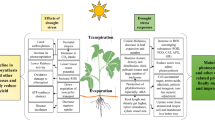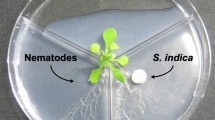Abstract
One of the main abiotic stresses that strongly affects plant survival and the primary cause of crop loss around the world is drought. Drought stress leads to sequential morphological, physiological, biochemical and molecular changes that can have severe effects on plant growth, development and productivity. As a consequence of these changes, the interaction between plants and insects can be altered. Using cultivated Brassica oleracea plants, the parasitoid Microplitis mediator and its herbivorous host Mamestra brassicae, we studied the effect of drought stress on (1) the emission of plant volatile organic compounds (VOCs), (2) plant hormone titres, (3) preference and performance of the herbivore, and (4) preference of the parasitoid. Higher levels of jasmonic acid (JA) and abscisic acid (ABA) were recorded in response to herbivory, but no significant differences were observed for salicylic acid (SA) and indole-3-acetic acid (IAA). Drought significantly impacted SA level and showed a significant interactive effect with herbivory for IAA levels. A total of 55 VOCs were recorded and the difference among the treatments was influenced largely by herbivory, where the emission rate of fatty acid-derived volatiles, nitriles and (E)-4,8-dimethylnona-1,3,7-triene [(E)-DMNT] was enhanced. Mamestra brassicae moths preferred to lay eggs on drought-stressed over control plants; their offspring performed similarly on plants of both treatments. VOCs due to drought did not affect the choice of M. mediator parasitoids. Overall, our study reveals an influence of drought on plant chemistry and insect-plant interactions.





Similar content being viewed by others
Change history
04 May 2018
One of the main abiotic stresses that strongly affects plant survival and the primary cause of crop loss around the world is drought.
References
Allakhverdiev SI, Sakamoto A, Nishiyama Y, Inaba M, Murata N (2000) Ionic and osmotic effects of NaCl-induced inactivation of photosystems I and II in Synechococcus sp. Plant Physiol 123:1047–1056. doi:10.1104/pp.123.3.1047
Atkinson NJ, Urwin PE (2012) The interaction of plant biotic and abiotic stresses: from genes to the field. J Exp Bot 63:3523–3543. doi:10.1093/jxb/ers100
Avanci NC, Luche DD, Goldman GH, Goldman MHS (2010) Jasmonates are phytohormones with multiple functions, including plant defense and reproduction. Genet Mol Res 9:484–505. doi:10.4238/vol9-1gmr754
Copolovici L, Kännaste A, Remmel T, Niinemets Ü (2014) Volatile organic compound emissions from Alnus glutinosa under interacting drought and herbivory stresses. Environ Exp Bot 100:55–63. doi:10.1016/j.envexpbot.2013.12.011
Dakhma WS, Zarrouk M, Cherif A (1995) Effects of drought-stress on lipids in rape leaves. Phytochemistry 40:1383–1386. doi:10.1016/0031-9422(95)00459-K
de Rijk M, Dicke M, Poelman EH (2013) Foraging behaviour by parasitoids in multiherbivore communities. Anim Behav 85:1517–1528. doi:10.1016/j.anbehav.2013.03.034
Dicke M, Baldwin IT (2010) The evolutionary context for herbivore-induced plant volatiles: beyond the ‘cry for help’. Trends Plant Sci 15:167–175. doi:10.1016/j.tplants.2009.12.002
Dicke M, van Beek TA, Posthumus MA, Ben Dom N, van Bokhoven H, De Groot A (1990) Isolation and identification of volatile kairomone that affects acarine predator-prey interactions: involvement of host plant in its production. J Chem Ecol 16:381–396. doi:10.1007/BF01021772
Dicke M, van Loon JJA, Soler R (2009) Chemical complexity of volatiles from plants induced by multiple attack. Nat Chem Biol 5:317–324. doi:10.1038/nchembio.169
Fraire-Velázquez S, Rodríguez-Guerra R, Sánchez-Calderón L (2011) Abiotic and biotic stress response crosstalk in plants. In: Shanker A, Venkateswarlu B, eds. Abiotic stress response in plants—physiological, biochemical and genetic perspectives, InTech, Croatia, pp 3–26. doi:10.5772/23217
Gouinguené SP, Turlings TCJ (2002) The effects of abiotic factors on induced volatile emissions in Corn plants. Plant Physiol 129:1296–1307. doi:10.1104/pp.001941
Gutbrodt B, Dorn S, Mody K (2012) Drought stress affects constitutive but not induced herbivore resistance in apple plants. Arthropod Plant Interact 6:171–179. doi:10.1007/s11829-011-9173-0
Harvey JA, Weber D, De Clercq P, Gols R (2013) A bodyguard or a tastier meal? Dying caterpillar indirectly protects parasitoid cocoons by offering alternate prey to a generalist predator. Entomol Exp Appl 149:219–228. doi:10.1111/eea.12127
Hasanuzzaman M, Nahar K, Alam M, Roychowdhury R, Fujita M (2013) Physiological, biochemical, and molecular mechanisms of heat stress tolerance in plants. Int J Mol Sci 14:9643–9684. doi:10.3390/ijms14059643
Holopainen JK, Gershenzon J (2010) Multiple stress factors and the emission of plant VOCs. Trends Plant Sci 15:176–184. doi:10.1016/j.tplants.2010.01.006
Huberty AF, Denno RF (2004) Plant water stress and its consequences for herbivorous insects: a new synthesis. Ecology 85:1383–1398. doi:10.1890/03-0352
Iuchi S, Kobayashi M, Yamaguchi-Shinozaki K, Shinozaki K (2000) A stress-inducible gene for 9-cis-epoxycarotenoid dioxygenase involved in abscisic acid biosynthesis under water stress in drought-tolerant Cowpea. Plant Physiol 123:553–562. doi:10.1104/pp.123.2.553
Kessler A, Baldwin IT (2001) Defensive function of herbivore-induced plant volatile emissions in nature. Science 291:2141–2144. doi:10.1126/science.291.5511.2141
Kleczkowski K, Schell J (1995) Phytohormone conjugates: nature and function. Crit Rev Plant Sci 14:283–298. doi:10.1080/07352689509382361
Kotak S, Larkindale J, Lee U, von Koskull-Döring P, Vierling E, Scharf K-D (2007) Complexity of the heat stress response in plants. Curr Opin Plant Biol 10:310–316. doi:10.1016/j.pbi.2007.04.011
Kunkel BN, Brooks DM (2002) Cross talk between signaling pathways in pathogen defense. Curr Opin Plant Biol 5:325–331. doi:10.1016/S1369-5266(02)00275-3
Liu X, Baird WV (2003) Differential expression of genes regulated in response to drought or salinity stress in sunflower. Crop Sci 43:678–687. doi:10.2135/cropsci2003.6780
Mattson WJ, Haack RA (1987) Role of drought in outbreaks of plant-eating insects. Bioscience 37:110–118. doi:10.2307/1310365
McCormick AC, Unsicker SB, Gershenzon J (2012) The specificity of herbivore-induced plant volatiles in attracting herbivore enemies. Trends Plant Sci 17:303–310. doi:10.1016/j.tplants.2012.03.012
Mewis I, Khan MAM, Glawischnig E, Schreiner M, Ulrichs C (2012) Water stress and aphid feeding differentially influence metabolite composition in Arabidopsis thaliana (L.). PLoS ONE 7:e48661. doi:10.1371/journal.pone.0048661
Mittler R (2006) Abiotic stress, the field environment and stress combination. Trends Plant Sci 11:15–19. doi:10.1016/j.tplants.2005.11.002
Morales MT, Angerosa F, Aparicio R (1999) Effect of the extraction conditions of virgin olive oil on the lipoxygenase cascade: chemical and sensory implications. Grasas Aceites 50:114–121. doi:10.3989/gya.1999.v50.i2.645
Muller M, Munne-Bosch S (2011) Rapid and sensitive hormonal profiling of complex plant samples by liquid chromatography coupled to electrospray ionization tandem mass spectrometry. Plant Methods 7:37. doi:10.1186/1746-4811-7-37
Ormeño E et al (2007) Water deficit stress induces different monoterpene and sesquiterpene emission changes in Mediterranean species. Relationship between terpene emissions and plant water potential. Chemosphere 67:276–284. doi:10.1016/j.chemosphere.2006.10.029
Pieterse CMJ, van der Does D, Zamioudis C, Leon-Reyes A, van Wees SCM (2012) Hormonal modulation of plant immunity. Annu Rev Cell Dev Biol 28:489–521. doi:10.1146/annurev-cellbio-092910-154055
Pivnick KA, Jarvis BJ, Slater GP, Gillott C, Underhill EW (1990) Attraction of the Diamondback moth (Lepidoptera: Plutellidae) to volatiles of oriental mustard: The influence of age, sex, and prior exposure to mates and host plants. Environ Entomol 19:704–709
Poelman EH et al (2012) Hyperparasitoids use herbivore-induced plant volatiles to locate their parasitoid host. PLoS Biol 10:e1001435. doi:10.1371/journal.pbio.1001435
Ponzio C, Gols R, Pieterse CMJ, Dicke M (2013) Ecological and phytohormonal aspects of plant volatile emission in response to single and dual infestations with herbivores and phytopathogens. Funct Ecol 27:587–598. doi:10.1111/1365-2435.12035
Ponzio C, Gols R, Weldegergis BT, Dicke M (2014) Caterpillar-induced plant volatiles remain a reliable signal for foraging wasps during dual attack with a plant pathogen or non-host insect herbivore. Plant Cell Environ 37:1924–1935. doi:10.1111/pce.12301
Reay-Jones FPF, Wilson LT, Showler AT, Reagan TE, Way MO (2007) Role of oviposition preference in an invasive Crambid impacting two graminaceous host crops. Environ Entomol 36:938–951. doi:10.1603/0046-225X
Renwick JAA, Chew FS (1994) Oviposition behavior in Lepidoptera. Annu Rev Entomol 39:377–400. doi:10.1146/annurev.en.39.010194.002113
Saruhan N, Saglam A, Kadioglu A (2012) Salicylic acid pretreatment induces drought tolerance and delays leaf rolling by inducing antioxidant systems in maize genotypes. Acta Physiol Plant 34:97–106. doi:10.1007/s11738-011-0808-7
Schoonhoven LM, van Loon JJA, Dicke M (2005) Insect-plant biology, 2nd edn. Oxford University Press, Oxford
Schwab W, Davidovich-Rikanati R, Lewinsohn E (2008) Biosynthesis of plant-derived flavor compounds. Plant J 54:712–732. doi:10.1111/j.1365-313X.2008.03446.x
Shen J et al (2014) A 13-lipoxygenase, TomloxC, is essential for synthesis of C5 flavour volatiles in tomato. J Exp Bot 65:419–428. doi:10.1093/jxb/ert382
Shinozaki K, Yamaguchi-Shinozaki K, Seki M (2003) Regulatory network of gene expression in the drought and cold stress responses. Curr Opin Plant Biol 6:410–417. doi:10.1016/s1369-5266(03)00092-x
Showler AT, Moran PJ (2003) Effects of drought-stressed cotton, Gossypium hirsutum L., on Beet Armyworm, Spodoptera exigua (Hübner) oviposition, and larval feeding preferences and growth. J Chem Ecol 29:1997–2011. doi:10.1023/a:1025626200254
Sicher RC, Barnaby JY (2012) Impact of carbon dioxide enrichment on the responses of maize leaf transcripts and metabolites to water stress. Physiol Plant 144:238–253. doi:10.1111/j.1399-3054.2011.01555.x
Soler R et al (2012) Neonates know better than their mothers when selecting a host plant. Oikos 121:1923–1934. doi:10.1111/j.1600-0706.2012.20415.x
Stam JM et al (2014) Plant interactions with multiple insect herbivores: from community to genes. Annu Rev Plant Biol 65:689–713. doi:10.1146/annurev-arplant-050213-035937
Takabayashi J, Dicke M (1992) Response of predatory mites with different rearing histories to volatiles of uninfested plants. Entomol Exp Appl 64:187–193. doi:10.1111/j.1570-7458.1992.tb01608.x
Takabayashi J, Dicke M, Posthumus MA (1994) Volatile herbivore-induced terpenoids in plant-mite interactions: variation caused by biotic and abiotic factors. J Chem Ecol 20:1329–1354. doi:10.1007/bf02059811
Tariq M, Wright DJ, Bruce TJA, Staley JT (2013) Drought and root herbivory interact to alter the response of above-ground parasitoids to aphid infested plants and associated plant volatile signals. PLoS ONE 8:e69013. doi:10.1371/journal.pone.0069013
Turlings TCJ, Bernasconi M, Bertossa R, Bigler F, Caloz G, Dorn S (1998) The induction of volatile emissions in maize by three herbivore species with different feeding habits: possible consequences for their natural enemies. Biol Control 11:122–129. doi:10.1006/bcon.1997.0591
Wang Y, Mopper S, Hasenstein KH (2001) Effects of salinity on endogenous ABA, IAA, JA, and SA in Iris hexagona. J Chem Ecol 27:327–342. doi:10.1023/a:1005632506230
Wang H, Guo W-F, Zhang P-J, Wu Z-Y, Liu S-S (2008) Experience-induced habituation and preference towards non-host plant odors in ovipositing females of a moth. J Chem Ecol 34:330–338. doi:10.1007/s10886-008-9433-3
Acknowledgments
We thank Joop van Loon for his advice during the execution of the experiment. We are grateful for the guidance and support of Francel Verstappen and Tatsiana Charnikhova of the Laboratory of Plant Physiology, Wageningen University during the phytohormone analyses. We thank Léon Westerd, Frans van Aggelen and André Gidding for rearing the insects and Unifarm of Wageningen University for supplying plants. This work was supported by the Earth and Life Sciences Council of the Netherlands Organisation for Scientific Research (NWO-ALW) through grant 844.10.005 and the Spinoza award to M.D.
Author information
Authors and Affiliations
Corresponding author
Additional information
Communicated by Richard Karban.
B. T. Weldegergis and F. Zhu made equal contributions to the article.
Rights and permissions
About this article
Cite this article
Weldegergis, B.T., Zhu, F., Poelman, E.H. et al. Drought stress affects plant metabolites and herbivore preference but not host location by its parasitoids. Oecologia 177, 701–713 (2015). https://doi.org/10.1007/s00442-014-3129-x
Received:
Accepted:
Published:
Issue Date:
DOI: https://doi.org/10.1007/s00442-014-3129-x




